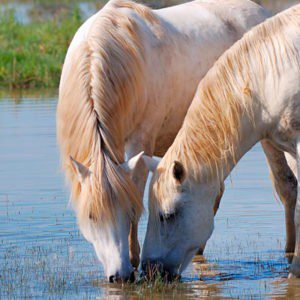One thing that strikes fear into the heart of many horse people is the term thrush. Thrush is a severe infection that affects the frog of the hoof. This painful condition can cause serious problems, including lameness. Although there is no way to be 100% sure your horse will never get thrush, there are some ways to minimize the odds of that happening. A Dahlonega, GA vet lists some of them below.
Offer Optimal Conditions
Wet and muddy conditions are often a precursor to thrush. We know, paddocks and pastures are going to get muddy sometimes. However, if your property stays soggy after rains have passed, you may want to look into drainage solutions. Clean Silver’s hooves before and after turning him out in wet conditions.
Farrier Visits
Overgrown hooves can cause a whole slew of problems, including thrush. Ill-fitting shoes are also a concern, as they can contribute to thrush. Keep Silver on a steady schedule for hoof care.
Clean Bedding
Clean bedding is important for many reasons, but it’s crucial for preventing thrush. Spot clean waste and wet spots daily, and do more thorough cleanings regularly. It’s worth noting that some beddings, like shredded wood ones—particularly those made from coniferous trees, such as pine—can actually change the PH of the soil, making it easier for thrush bacteria to thrive. Ask your vet for specific recommendations.
Picking
Silver can go a few days without being brushed, but you should never skip his hoof care. Clean his hooves at daily, and before and after every ride and turnout. Be extra vigilant if your horse has full pads on his shoes!
Turnout Time
In the wild, horses are constantly moving around, and rarely, if ever, stay in the same spot all day. Although Silver may be comfortable in his stall, he needs fresh air and activity. Make sure your hooved pal is getting adequate turnout time.
Vigilance
Pay close attention to Silver’s hoof condition. It’s also important to know what to look for. You may see a black discharge coming from the frog, which may have discoloration or soft spots. This often has a foul odor. Lameness and sensitivity can also be signs. However, not all horses show visible signs of discomfort early on. Ask your vet for more information.
Please reach out to us, your Dahlonega, GA vet clinic, anytime. We’re here to help!

